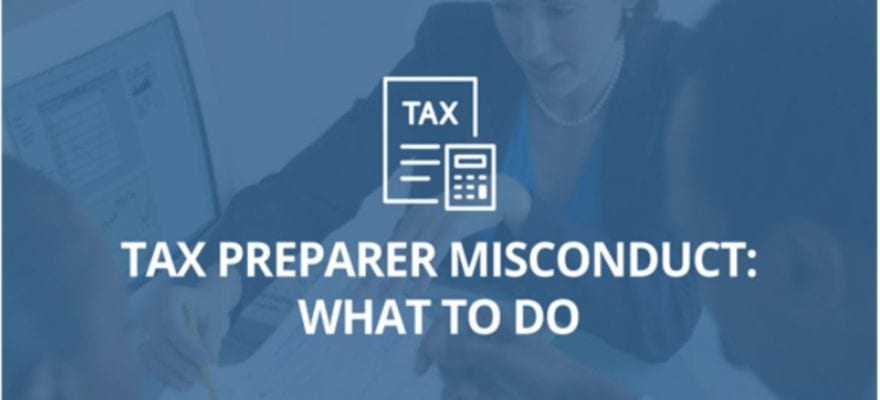Few people have the time, experience, or inclination to navigate the often-complicated federal and state tax forms. Instead, they rely on professional tax preparer misconduct to complete and submit their personal and business returns.
Unfortunately, there are tax preparers who abuse the trust placed in them. They attempt to secure a higher refund for you by putting false information on your income tax returns. Examples include:
- False deductions
- False dependent’s information
- Inflated business or personal expenses
- Excessive charity contributions
- Claiming credits that you wouldn’t normally qualify for, such as nonexistent childcare or education expenses
This type of fraud is especially common among independent tax preparers. A big part of the problem is that the rules regarding who can prepare tax returns are comparatively lax. While professionals like tax attorneys, chartered accountants, and enrolled agents have to comply with government regulations, independent tax preparers have next to no oversight. Getting a tax preparer tax ID number from the IRS is easy and most states (New Jersey included), don’t require testing or ongoing education.
For this reason, the IRS advises taxpayers to avoid preparers who base their fee on a percentage of the refund or claim to be able to get you a bigger refund than anyone else. It gets more difficult when the preparer is a licensed professional, like an accountant or attorney who is either incompetent or deliberately misuses their position to benefit themselves at your expense.
What Should You Do If Your Tax Preparer Commits Fraud?
If you suspect that your tax preparer is guilty of misconduct, you can submit a completed Form 14157 to the IRS. If they completed a fraudulent tax return on your behalf and/or you received a larger refund than you were entitled to, you will also have to submit a completed Form 14157-A, which is a fraud or misconduct affidavit. If the IRS sends you a notice, you can mail these forms along with copies of any supporting documentation.
If the IRS finds evidence of intentional wrongdoing after an investigation, it may revoke the person’s preparer tax identification number. Licensed tax professionals could also be subjected to sanctions from their state and industry regulatory bodies.
Fortunately, the IRS understands that you may not have knowledge of the fraudulent information on your tax forms. However, you will still be responsible for the entire amount of tax due, plus any interest and penalties.
How to Avoid Problems in The Future
To avoid future problems with a tax preparer, take the time to do some research before placing your trust in one individual or business. Ask friends, family, and colleagues for recommendations. The IRS also maintains a directory of federal tax return professionals that you can use to lookup local CPAs, attorneys, and other parties who hold professional credentials recognized by the IRS.
Other tips include:
- Look for a tax preparer who is available year-round instead of someone who sets up shop only during filing season.
- Review their Better Business Bureau listing or, for credentialed preparers, confirm their license status and check for any recent disciplinary actions.
- Never give tax documents or Social Security information to tax preparers unless you’ve engaged their services. Some unethical preparers have unauthorized tax returns using this information.
- Confirm that the preparer will e-file your tax return. This is a requirement for those who do taxes for more than 10 clients.
- Never sign an incomplete or blank tax return.
Contact a New Jersey Tax Law Attorney
When a professional preparer tells you whether or not you have a tax liability and you rely on that advice, you have a valid defense to a charge of tax evasion, especially if the party is an accountant or attorney. Unless you have an accounting background yourself, you cannot be expected to challenge professional advice.
At Paladini Law, we have helped many clients who unwittingly incurred a huge tax obligation due to preparer misconduct. We can contact the IRS on your behalf to negotiate a reduction in penalties or forgiveness of the error. If you are unable to pay the unexpected tax bill immediately, Attorney Brad Paladini will help you negotiate an offer in compromise, payment plan or, if you owe state taxes, a New Jersey installment agreement. To schedule a consultation, please contact us or call 201-381-4472.



